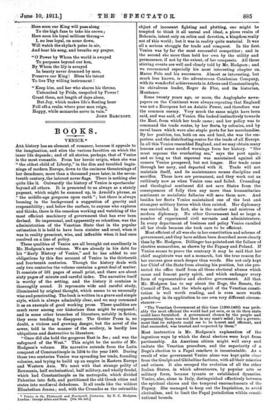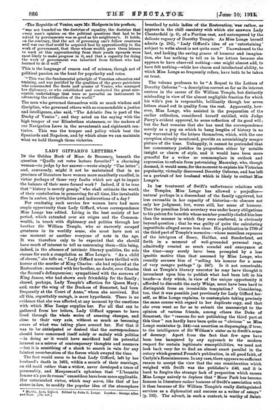BOOKS.
VENICE.* ALL history has an element of romance, because it appeals to the imagination, and stirs the various faculties on which the inner life depends ; and of all stories, perhaps, that of Venice is the most romantic. From her heroic origin, when she was "the eldest child of Liberty," in the dim and troubled begin- nings of modern Europe, down to the ominous threatenings of her decadence, more than a thousand years later, in the seven- teenth century, the interest never flags. There is nothing else quite like it. Outwardly the history of Venice is spectacular beyond all others. It is presented to us always as a stately pageant, which might be summed up, in Arnold's phrase, as " the middle-age gorgeous upon earth "; but there is always looming in the background a suggestion of gravity and responsibility ; and below the surface, to anyone who explores and thinks, there is the ceaseless working and watching of the most efficient machinery of government that has ever been devised. So impersonal, and apparently so relentless, was the administration of the Venetian State that in the popular estimation it is held to have been sinister and cruel, when it was in reality prescient, wise, and inflexible when it had once resolved on a line of policy.
These qualities of Venice are all brought out excellently in Mr. Hodgson's new volume. We are already in his debt for his "Early History of Venice," and he has added to our obligations by this fine account of Venice in the thirteenth and fourteenth centuries. Though the history deals with only two centuries the volume contains a great deal of matter. It consists of 581 pages of small print, and there are about sixty pages of minute and careful index. The narrative itself is worthy of the setting, and the history it contains is thoroughly sound. It represents wide and careful study, illuminated by original thought, which seems to us unusually wise and penetrating. The book is written in a grave and simple style, which is always admirably clear, and we may commend it as an example of good working prose. These qualities are much rarer among our historians than might be supposed ; and in some other branches of literature, notably in fiction, they seem tending to disappear. The Gutter Press is, no doubt, a vicious and growing danger, but the novel of the sewer, told in the manner of the scullery, is hardly less ubiquitous and destructive to literature.
"Once did she hold the gorgeous East in fee ; and was the safeguard of the West." This might be the motto of Mr. Hodgson's volume. His narrative extends from the Latin conquest of Constantinople in 1204 to the year 1400. During those two centuries Venice was spreading her trade, founding colonies, and trying to build up an empire in Eastern Europe and Western Asia. We meet with that strange polity of Roumania, half ecclesiastical, half military, and wholly feudal, which had Constantinople as its metropolis, which divided Palestine into fiefs, and partitioned the old Greek cities and states into media3val dukedoms. It all reads like the wildest Elizabethan drama ; and, with the Crusades as the ostensible
• Venice in the Thirteenth and Fourteenth Centuries. By F. C. Hodgson. London George Allen and Sons. [10s. 6d. net.] object of incessant fighting and plotting, one might be tempted to think it all unreal and ideal, a pious realm of Bohemia, intent only on relics and devotion, a kingdom really not of this world ; but it was in reality quite material. It was all a serious struggle for trade and conquest. In the first. Venice was by far the most successful competitor ; and in the second she more than held her own by the utility and permanence, if not by the extent, of her conquests. All these stirring events are well and clearly told by Mr. Hodgson ; and
we recommend especially his most interesting chapter on.. Marco Polo and his successors. Almost as interesting, but much less known, is the adventurous Catalonian Company, with its wonderful achievements in Athens and Constantinople, its chivalrous leader, Roger de Flor, and its historian, Muntaner.
Some twenty years ago, or more, the Anglophobe news- papers on the Continent were always repeating that England' was not a European but an Asiatic Power, and therefore was the common enemy. Very much the same might have been said, and was said, of Venice. She looked instinctively towards the East, from which her trade came; and her policy was to command the trade routes, by her fleets, by colonies, and by naval bases which were also staple ports for her merchandise.
By her position, too, both on sea and land, she was the em- porium and the distributing centre for the trade of all Europe.
In all this Venice resembled England, and we may obtain many lessons and some needed warnings from her history. "She must espouse the everlasting sea," says the poet again ; and so long as that espousal was maintained against all corners Venice prospered, but not longer. Her trade came through her navy, and departed with it. Trade will not maintain itself, and its maintenance means discipline and sacrifice. These laws are permanent, and they work out as ruthlessly now as when Venice rose and failed. Crusading and theological sentiment did not save States from the consequences of folly then any more than humanitarian sentiment or socialistic fallacies will save them now. And besides her fleets Venice maintained one of the best and strongest military forces which then existed. Her diplomacy was unrivalled. In fact, she is the mother and mistress of modern diplomacy. No other Government had so large a number of experienced civil servants and administrators.
In every department of business and policy Venice excelled all her rivals because she took care to be efficient.
Most efficient of all was she in her constitution and scheme of government, and they have seldom been described more clearly than by Mr. Hodgson. Dollinger has pointed out the failure of elective monarchies, as shown by the Papacy and Poland. If Venice seems to prove the contrary it may be said that her chief magistrate was not a monarch, but the true reason for her success goes much deeper than words. She not only kept her Chief of the State from abusing his position, but she pro- tected the office itself from all those electoral abuses which cause and foment party spirit, and which endanger every form of representative and elective government. All that.
Mr. Hodgson has to say about the Doge, the Senate, the Council of Ten, and the whole spirit of the Venetian consti- tution is well worth reading, and is even more worth pondering in its application to our own very different circum- stances :—
" The Venetian Government at this time (1200-1400) was prob- ably the most efficient the world had yet seen, or in its then state could have furnished. A government chosen by the people and representing them was not then in any man's mind ; but a govern- ment that its subjects could see to be honest and efficient, and that succeeded, was trusted and respected by them."
Most instructive is Mr. Hodgson's explanation of the ingenious ways by which the ducal electors were kept from
partisanship. An American citizen might well envy and imitate the Venetian procedure, and the superiority of a Doge's election to a Papal conclave is incontestable. As a result of wise government Venice alone was kept quite clear from the Guelph and Ghibelline factions, with all their miseries and crimes. It also escaped the evolution of all the other Italian States, in which adventurers, by popular arts or military force, became tyrants or established dynasties.
Venice, also, alone in Italy, distinguished effectively between the spiritual claims and the temporal encroachments of the Papacy. She managed to keep out the Inquisition, to avoid clericalism, and to limit the Papal jurisdiction within consti- tutional bounds.
'The Republieot-Vanice4 saya Mr. Hedgsen in his preface; "Was not founded,on- thedeetrine-of equality, the doctrine- that every man's opinion: on the political questions that had to be sqlved by governments was as good as his neighbour's. lt holds, on the contrary, that the act of governing one's fellow creatures well was one that 'could be acquired best by apprenticeship to the work of government, that those whosewealth gave them leisure to work at- this- apprenticeship from their youth upwards were most likely to make progress in it, and that a capacity for doing the work of government was inherited from fathers who had learned to do it vrell:N -This is the language of reason and of science, though not of political passion on the hunt for popularity and votes.
' " This was the fundamental principle of Venetian education and training, and was justified by the qualities of the grave patricians -who commanded the -fleet* antt- armies- of Venice, who managed her diplomacy, or who established and conducted the great mer- cantile. undertakings that were- so- powerful- an instrument in advancing the civilization of the world."
The men who governed themselves with so much wisdom and discipline, who governed others with so commendable a justice and intelligence, also. said, "The Adriatic Sea is part of the Duchy of Venice"; and they acted oir the saying with the high temper of our Elizabethan statesmen, or the makers of atir Navigation Laws in. the seventeenth and eighteenth can- tnries. This was the temper and policy which beat the Spaniards and Napoleon, and by which alone we can maintain
-what we hold through those victories.











































 Previous page
Previous page